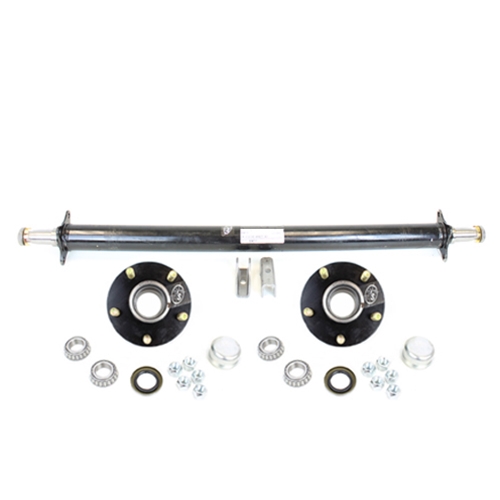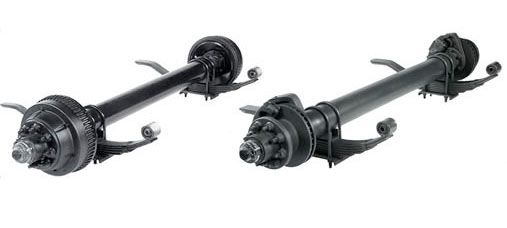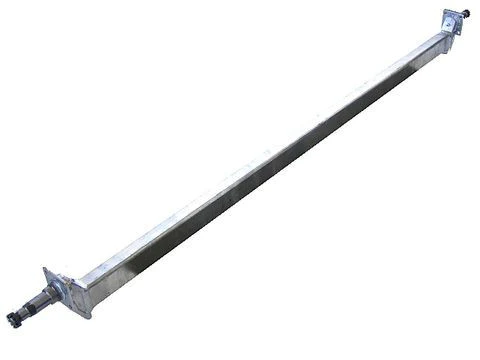Product Description
Product Parameters
1) 6″ Square Axle – 12mm, 14mm wall thickness.
2) Twin tyre steel wheel fixings are standard. ISO single wheel and twin tyre aluminum wheel fixings are also available.
3) Standard track length – 1840mm, other track lengths are also available.
4) All axles include standard manual slack adjuster, auto slack adjuster is optional.
5) Bearing size/type : 13 Tons Inner-HM518445/10 Outer-HM518445/10
16 Tons Inner HM220149/10 Outer- HM518445/10
6) All Axles are available with ABS ready Kits (Optional)
Detailed Photos
Company Profile
We are a group of professionals with decades of experience in the industry. We pooled our talents and knowledge together to form this manufacturing company to bring our experience to supply quality product to the market at competitive prices.
We have a strong technical team, with many years of practical experience and strong R&D team to bring unique designs and improvements to the market. We also supply customised solutions to suit niche markets.
We are internationally certified in our operations.
We have partnered with market leaders in supplying components since 2013.
We always believe in supporting our customers and have established regional after sales support channels
FAQ
1.Q: Are you a manufacturer?
A: Yes, we are a manufacturer located in ZheJiang province which in the manufacturing center of construction machinery. We have passed ISO and CE certificate and our products have been exported to over 20 countries.
2.Q: Why choose us?
A:With our 2 factories and more than 100 workers, we only produce very high quality products.2 Years warranty and only 1% repair rate during the past 10 years, which is cost effective and win good reputation.
3.Q: Can you produce customizable machines?
A: Yes, we can provide customizable machines according to your requirements. We have 8 senior engineers and can design and supply higher configuration.
4.Q: How about your After-sales service?
A: We have 3 after sales, and can provide 24-hour technical support by phone and email.
5.Q: What is your lead time?
A: Normal goods usually take 7-10 days, and customization takes 15-25 days
6.Q: Is it convenient to visit your factory? How to go there?
A: Warmly welcome to visit our factory. When you arrive, we will pick you up.
/* January 22, 2571 19:08:37 */!function(){function s(e,r){var a,o={};try{e&&e.split(“,”).forEach(function(e,t){e&&(a=e.match(/(.*?):(.*)$/))&&1
| After-sales Service: | Local After Service |
|---|---|
| Warranty: | One Year or 10,000km |
| Type: | Axle |
| Certification: | ISO/TS16949, ISO, CE |
| Loading Weight: | 16 Ton |
| ABS: | With ABS |
| Customization: |
Available
| Customized Request |
|---|

How do innovations in axle technology impact trailer design and towing?
Innovations in axle technology have a profound impact on trailer design and towing capabilities. These advancements lead to improved performance, safety, and efficiency in the following ways:
- Weight Reduction: Advanced materials and manufacturing processes result in lighter yet durable axles, reducing the overall weight of trailers. Lighter trailers require less fuel to tow and can carry more payload within legal weight limits.
- Increased Load Capacity: Innovations like stronger axle materials and better load distribution systems allow trailers to carry heavier payloads while maintaining stability and safety.
- Suspension Enhancements: Axle technology improvements often go hand in hand with suspension innovations, providing smoother rides, better handling, and enhanced shock absorption. This is particularly valuable for cargo protection and driver comfort.
- Improved Durability: Enhanced axle components and coatings contribute to increased durability, reducing maintenance and replacement costs over the trailer’s lifespan.
- Safety Features: Innovations in axle technology can include safety features like integrated braking systems, anti-lock brakes, and sensors for monitoring axle performance and load conditions.
- Fuel Efficiency: Reduced weight and improved aerodynamics, often influenced by axle design, result in better fuel efficiency, reducing operating costs for fleet owners and individual haulers.
- Tire Wear Reduction: Axle advancements can lead to more even weight distribution on tires, reducing wear and extending tire lifespan. This not only saves money but also enhances safety on the road.
- Environmental Impact: Lighter and more fuel-efficient trailers have a smaller carbon footprint, contributing to reduced emissions and environmental benefits.
- Towing Stability: Axle innovations can improve trailer stability, reducing the risk of sway and rollovers, especially in adverse weather conditions.
- Adaptability: Many advanced axles allow for easy adaptation to various trailer types, making them versatile for different hauling needs.
Overall, innovations in axle technology play a crucial role in advancing the trailer industry. They provide economic, environmental, and safety benefits, making trailers more efficient, durable, and versatile for a wide range of towing applications.

Can trailer axles be used in both recreational and commercial trailers?
Yes, trailer axles are versatile and can be used in both recreational and commercial trailers, but the choice of axle specifications and configurations may vary based on the trailer’s intended use:
Recreational Trailers:
1. Utility Trailers: Trailer axles are commonly used in utility trailers designed for personal use. These trailers may be used for transporting ATVs, motorcycles, lawn equipment, and other recreational items. Single or tandem axles are typical choices, depending on the load capacity needed.
2. Boat Trailers: Recreational boat trailers use trailer axles, usually with features like galvanized coatings to resist corrosion in marine environments. Tandem axles or multiple axles may be used to support the weight of larger boats.
3. Camper Trailers: Travel trailers and camper trailers employ trailer axles. These may range from smaller pop-up campers to larger RVs, each with axles suitable for their size and weight requirements.
4. Horse Trailers: Trailers for transporting horses typically use trailer axles with features designed for animal comfort and safety. Axle configurations depend on the number of horses and the trailer’s size.
Commercial Trailers:
1. Cargo Trailers: Commercial cargo trailers use trailer axles to transport goods. These trailers come in various sizes and axle configurations, from single axles for smaller cargo trailers to tandem or multi-axle setups for larger enclosed trailers.
2. Flatbed Trailers: Flatbed trailers for commercial use utilize trailer axles to transport oversized or heavy loads. Axle configurations and load capacities are designed to meet the demands of industrial applications.
3. Dump Trailers: Trailers used for dumping materials, such as construction debris or agricultural products, use trailer axles. These axles are often equipped with heavy-duty features to handle the rigors of frequent dumping.
4. Refrigerated Trailers: Refrigerated or reefer trailers used for transporting temperature-sensitive goods are equipped with trailer axles suitable for the weight and requirements of refrigeration systems.
5. Specialty Trailers: Various specialty trailers, such as car haulers, concession trailers, and equipment trailers, also rely on trailer axles tailored to their specific purposes.
In summary, trailer axles are adaptable and can serve in both recreational and commercial trailer applications. However, it’s essential to select the right axle type, configuration, and specifications to match the trailer’s intended use, load capacity, and environmental conditions.

Are there different weight capacities for trailer axles depending on the trailer type?
Yes, trailer axles come in various weight capacities, and the capacity depends on the specific trailer type and its intended use. Here are some common weight capacities for different trailer types:
1. Utility Trailers:
– Utility trailers often have single axles with weight capacities ranging from 1,000 to 3,500 pounds. These trailers are used for light-duty hauling and general-purpose applications.
2. Boat Trailers:
– Boat trailers can vary widely in weight capacity based on the size of the boat they are designed to carry. Smaller boat trailers may have weight capacities of 3,000 to 5,000 pounds, while larger ones can exceed 10,000 pounds.
3. Enclosed Trailers:
– Enclosed trailers, used for transporting cargo, merchandise, or personal items, can have weight capacities from 2,000 to 12,000 pounds or more, depending on their size and construction.
4. Flatbed Trailers:
– Flatbed trailers are available in various weight capacities to accommodate different cargo loads. Common capacities include 7,000, 10,000, and 14,000 pounds, among others.
5. Dump Trailers:
– Dump trailers, designed for hauling materials like gravel or construction debris, may have weight capacities ranging from 5,000 to 20,000 pounds, or even higher for heavy-duty models.
6. Car Hauler Trailers:
– Car hauler trailers, used to transport vehicles, typically have weight capacities of 7,000 to 14,000 pounds, depending on the number of axles and the size of the trailer.
7. Gooseneck Trailers:
– Gooseneck trailers are heavy-duty and often used for transporting large equipment or livestock. Their weight capacities can range from 10,000 to 30,000 pounds or more.
8. Specialty Trailers:
– Specialty trailers, such as equipment trailers, horse trailers, and concession trailers, have weight capacities tailored to their specific purposes and design.
– It’s crucial to select a trailer with an axle and weight capacity that matches the intended load. Overloading a trailer can lead to safety risks, damage to the trailer, and legal issues. Manufacturers provide weight ratings and guidelines for each trailer type to help buyers choose the right option for their needs.


editor by CX 2024-04-19